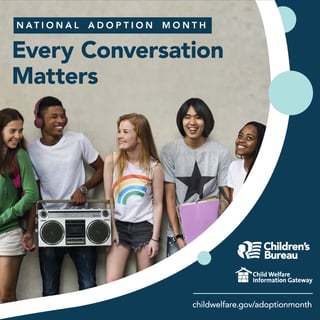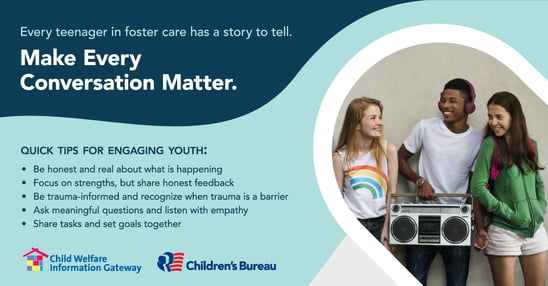
November is National Adoption Month, and this year's focus is on bringing foster children and teens into conversation so they can advocate for their personal identities and culture. Each child has a story and by listening to their perspectives, we can empower our youth to find their voice on their way to permanency.
In a letter launching this year's National Adoption Month, Aysha E. Schomburg, communicates the critical importance of this topic and how we can better include our foster youth.
Posted by: U.S. Dept. of Health and Human Service - Children's Bureau
2021 National Adoption Month Children's Bureau Message
by Aysha E. Schomburg, associate commissioner at the Children’s Bureau
This year, the Children's Bureau's National Adoption Month initiative—including its National Adoption Recruitment Campaign—focuses on the thousands of teenagers and young adults in foster care who need unconditional commitment, love, and support from a family. La Tika, who was adopted at age 21, shares what family means to her: “Family is critical in every stage of life. It helps to create the standard building blocks a child needs to live independently. Navigating the world on my own was scary, but finding a family was an oasis of opportunity.”
We must strive to first preserve families, but when needed, our adoption recruitment efforts should be individualized and inclusive of the youth’s family and culture. It is our duty to find the right family for each youth, a family that will honor the whole young person, including their race, language, and culture. Young people need to feel a sense of belonging and know that they have people in their corner. While we recognize youth in foster care need a family willing to make a commitment through legal permanency, we also know that young people tend to prioritize maintaining existing supportive relationships or relational permanency. Both legal and relational permanency are fundamental and can and should be pursued simultaneously. Nurturing relationships, are essential for healthy physical and emotional development. It is imperative that we devote our time and resources to ensure that every teen in foster care has permanent connections to support them, especially as they enter adulthood. And as we do that work, it is important to recognize and address disparities in outcomes when we observe them.
We know that teenagers, Black/African-American, and Native American children of any age are in care longer and are less likely to be adopted compared with White and Hispanic children. As of September 30, 2019, the number of children and youth waiting for adoption was over 120,000. Of those children, 24,648 (20 percent) were between the ages of 13 and 17, and 6,000 (nearly 25 percent) of those teenagers were Black/African American or Native American. Absent specific attention, Black/African-American or Native American young people will take longer to achieve permanency compared with their White or Hispanic peers, leaving them deprived of the love and stability of an adoptive family.
Key Facts and Statistics
The following statistics are provided by the Adoption and Foster Care Analysis and Reporting System (AFCARS) 2019 report:- Approximately one in five children in the U.S. foster care system waiting to be adopted were teens.
- Only 5 percent of all children adopted in 2019 were 15–18 years old.
- There were over 122,000 children and youth waiting to be adopted who were at risk of aging out of foster care without permanent family connections. The following are additional details about those children:
- More than half (52 percent) were male, and 48 percent were female.
- Regarding race and ethnicity, 22 percent were African American, 22 percent were Hispanic, and 44 percent were White.
- The average age was 8 years old, with 11 percent being between 15 and 18 years old.
- The average time in foster care was 31 months.
- Additionally, teens in foster care have an increased risk of homelessness and human trafficking compared with younger children.
What YOU Can Do to Help
Our first step is bringing awareness to the need of this topic. As you may know, these conversations are very unlikely to happen if they aren't invited into them.
Anyone, let alone a child or teen, who has been through traumatic events and hasn't been able to form secure connections is unlikely to open up. That is why mentors, families, educational professionals, and social workers must look for opportunities to engage with our foster youth.
When we empower them to speak up and share, we can learn so much! We learn what they are interested in, their cultural identity, things that remind them of their biological family that they want to honor and incorporate in their lives, etc. Foster teens need a supportive and stable family environment that their adoptive parent(s) can provide, however, they also feel important ties to existing relationships. Both are important and the best way to explore what that looks like for them and you is to have a conversation.

There is sometimes an unfair perception of foster teens being in foster care because they got themselves into trouble. The truth is that they almost always end up in foster care for reasons beyond their control. They have experienced trauma, and they need nurturing from stable adult role models. You can be the difference in these teens' lives and they can be an amazing addition to your family.
Many couples start off wanting to adopt a baby. Unfortunately, the waiting list for adopting infants can be long and the process can be complicated. Teens are at a critical developmental stage in their lives where they are longing to connect with people and solidifying their idea of what family is. We challenge you to have the conversation and reconsider looking into teen adoption from foster care.
So reach out to your local adoption agencies and get a little more information about adoption options. Most offer amazing support throughout the process and you might end up expanding your family sooner than you think.
For more information about our programs and how we can help, visit our website or contact us today.
